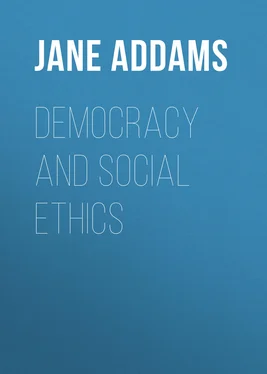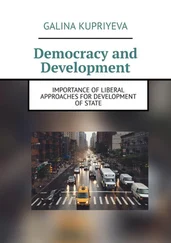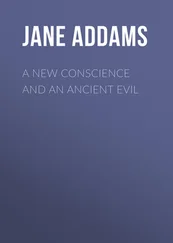Jane Addams - Democracy and Social Ethics
Здесь есть возможность читать онлайн «Jane Addams - Democracy and Social Ethics» — ознакомительный отрывок электронной книги совершенно бесплатно, а после прочтения отрывка купить полную версию. В некоторых случаях можно слушать аудио, скачать через торрент в формате fb2 и присутствует краткое содержание. Жанр: foreign_prose, История, foreign_edu, foreign_antique, на английском языке. Описание произведения, (предисловие) а так же отзывы посетителей доступны на портале библиотеки ЛибКат.
- Название:Democracy and Social Ethics
- Автор:
- Жанр:
- Год:неизвестен
- ISBN:нет данных
- Рейтинг книги:5 / 5. Голосов: 1
-
Избранное:Добавить в избранное
- Отзывы:
-
Ваша оценка:
- 100
- 1
- 2
- 3
- 4
- 5
Democracy and Social Ethics: краткое содержание, описание и аннотация
Предлагаем к чтению аннотацию, описание, краткое содержание или предисловие (зависит от того, что написал сам автор книги «Democracy and Social Ethics»). Если вы не нашли необходимую информацию о книге — напишите в комментариях, мы постараемся отыскать её.
Democracy and Social Ethics — читать онлайн ознакомительный отрывок
Ниже представлен текст книги, разбитый по страницам. Система сохранения места последней прочитанной страницы, позволяет с удобством читать онлайн бесплатно книгу «Democracy and Social Ethics», без необходимости каждый раз заново искать на чём Вы остановились. Поставьте закладку, и сможете в любой момент перейти на страницу, на которой закончили чтение.
Интервал:
Закладка:
Jane Addams
Democracy and Social Ethics
CHAPTER I
INTRODUCTION
It is well to remind ourselves, from time to time, that "Ethics" is but another word for "righteousness," that for which many men and women of every generation have hungered and thirsted, and without which life becomes meaningless.
Certain forms of personal righteousness have become to a majority of the community almost automatic. It is as easy for most of us to keep from stealing our dinners as it is to digest them, and there is quite as much voluntary morality involved in one process as in the other. To steal would be for us to fall sadly below the standard of habit and expectation which makes virtue easy. In the same way we have been carefully reared to a sense of family obligation, to be kindly and considerate to the members of our own households, and to feel responsible for their well-being. As the rules of conduct have become established in regard to our self-development and our families, so they have been in regard to limited circles of friends. If the fulfilment of these claims were all that a righteous life required, the hunger and thirst would be stilled for many good men and women, and the clew of right living would lie easily in their hands.
But we all know that each generation has its own test, the contemporaneous and current standard by which alone it can adequately judge of its own moral achievements, and that it may not legitimately use a previous and less vigorous test. The advanced test must indeed include that which has already been attained; but if it includes no more, we shall fail to go forward, thinking complacently that we have "arrived" when in reality we have not yet started.
To attain individual morality in an age demanding social morality, to pride one's self on the results of personal effort when the time demands social adjustment, is utterly to fail to apprehend the situation.
It is perhaps significant that a German critic has of late reminded us that the one test which the most authoritative and dramatic portrayal of the Day of Judgment offers, is the social test. The stern questions are not in regard to personal and family relations, but did ye visit the poor, the criminal, the sick, and did ye feed the hungry?
All about us are men and women who have become unhappy in regard to their attitude toward the social order itself; toward the dreary round of uninteresting work, the pleasures narrowed down to those of appetite, the declining consciousness of brain power, and the lack of mental food which characterizes the lot of the large proportion of their fellow-citizens. These men and women have caught a moral challenge raised by the exigencies of contemporaneous life; some are bewildered, others who are denied the relief which sturdy action brings are even seeking an escape, but all are increasingly anxious concerning their actual relations to the basic organization of society.
The test which they would apply to their conduct is a social test. They fail to be content with the fulfilment of their family and personal obligations, and find themselves striving to respond to a new demand involving a social obligation; they have become conscious of another requirement, and the contribution they would make is toward a code of social ethics. The conception of life which they hold has not yet expressed itself in social changes or legal enactment, but rather in a mental attitude of maladjustment, and in a sense of divergence between their consciences and their conduct. They desire both a clearer definition of the code of morality adapted to present day demands and a part in its fulfilment, both a creed and a practice of social morality. In the perplexity of this intricate situation at least one thing is becoming clear: if the latter day moral ideal is in reality that of a social morality, it is inevitable that those who desire it must be brought in contact with the moral experiences of the many in order to procure an adequate social motive.
These men and women have realized this and have disclosed the fact in their eagerness for a wider acquaintance with and participation in the life about them. They believe that experience gives the easy and trustworthy impulse toward right action in the broad as well as in the narrow relations. We may indeed imagine many of them saying: "Cast our experiences in a larger mould if our lives are to be animated by the larger social aims. We have met the obligations of our family life, not because we had made resolutions to that end, but spontaneously, because of a common fund of memories and affections, from which the obligation naturally develops, and we see no other way in which to prepare ourselves for the larger social duties." Such a demand is reasonable, for by our daily experience we have discovered that we cannot mechanically hold up a moral standard, then jump at it in rare moments of exhilaration when we have the strength for it, but that even as the ideal itself must be a rational development of life, so the strength to attain it must be secured from interest in life itself. We slowly learn that life consists of processes as well as results, and that failure may come quite as easily from ignoring the adequacy of one's method as from selfish or ignoble aims. We are thus brought to a conception of Democracy not merely as a sentiment which desires the well-being of all men, nor yet as a creed which believes in the essential dignity and equality of all men, but as that which affords a rule of living as well as a test of faith.
We are learning that a standard of social ethics is not attained by travelling a sequestered byway, but by mixing on the thronged and common road where all must turn out for one another, and at least see the size of one another's burdens. To follow the path of social morality results perforce in the temper if not the practice of the democratic spirit, for it implies that diversified human experience and resultant sympathy which are the foundation and guarantee of Democracy.
There are many indications that this conception of Democracy is growing among us. We have come to have an enormous interest in human life as such, accompanied by confidence in its essential soundness. We do not believe that genuine experience can lead us astray any more than scientific data can.
We realize, too, that social perspective and sanity of judgment come only from contact with social experience; that such contact is the surest corrective of opinions concerning the social order, and concerning efforts, however humble, for its improvement. Indeed, it is a consciousness of the illuminating and dynamic value of this wider and more thorough human experience which explains in no small degree that new curiosity regarding human life which has more of a moral basis than an intellectual one.
The newspapers, in a frank reflection of popular demand, exhibit an omniverous curiosity equally insistent upon the trivial and the important. They are perhaps the most obvious manifestations of that desire to know, that "What is this?" and "Why do you do that?" of the child. The first dawn of the social consciousness takes this form, as the dawning intelligence of the child takes the form of constant question and insatiate curiosity.
Literature, too, portrays an equally absorbing though better adjusted desire to know all kinds of life. The popular books are the novels, dealing with life under all possible conditions, and they are widely read not only because they are entertaining, but also because they in a measure satisfy an unformulated belief that to see farther, to know all sorts of men, in an indefinite way, is a preparation for better social adjustment—for the remedying of social ills.
Doubtless one under the conviction of sin in regard to social ills finds a vague consolation in reading about the lives of the poor, and derives a sense of complicity in doing good. He likes to feel that he knows about social wrongs even if he does not remedy them, and in a very genuine sense there is a foundation for this belief.
Читать дальшеИнтервал:
Закладка:
Похожие книги на «Democracy and Social Ethics»
Представляем Вашему вниманию похожие книги на «Democracy and Social Ethics» списком для выбора. Мы отобрали схожую по названию и смыслу литературу в надежде предоставить читателям больше вариантов отыскать новые, интересные, ещё непрочитанные произведения.
Обсуждение, отзывы о книге «Democracy and Social Ethics» и просто собственные мнения читателей. Оставьте ваши комментарии, напишите, что Вы думаете о произведении, его смысле или главных героях. Укажите что конкретно понравилось, а что нет, и почему Вы так считаете.












